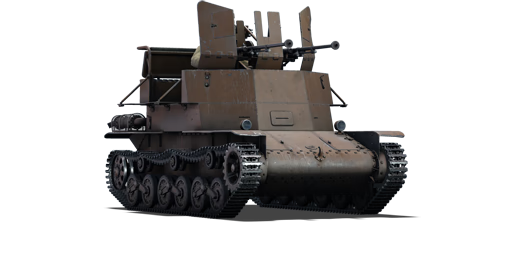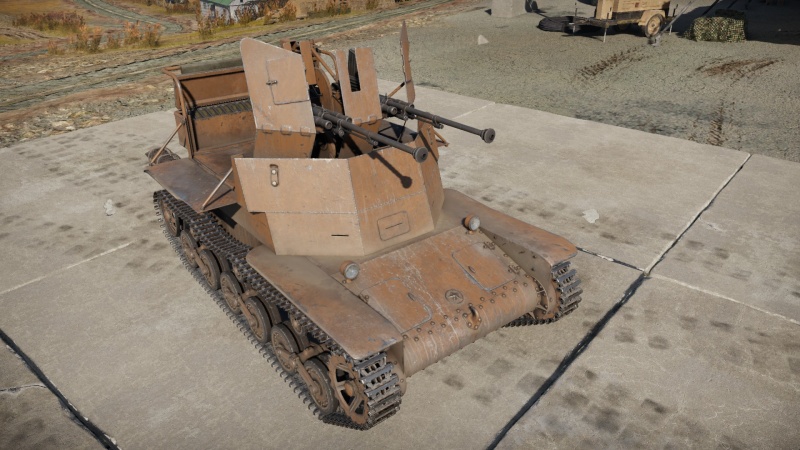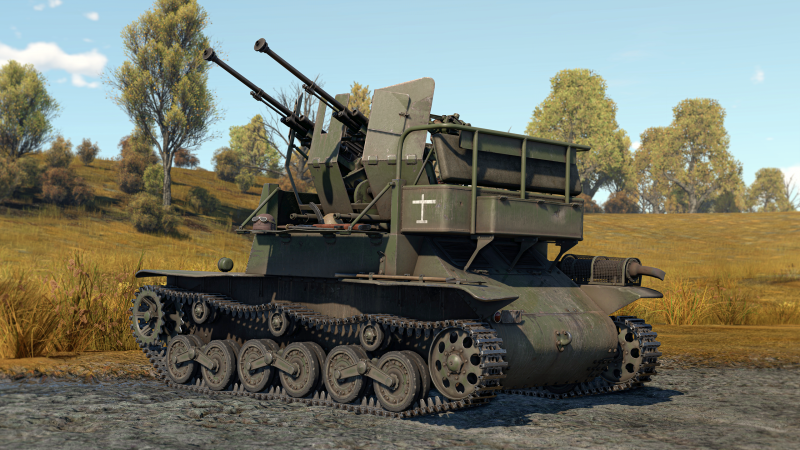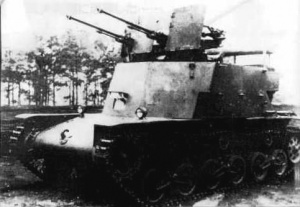Difference between revisions of "So-Ki"
m (→Media) |
(→Description) |
||
| (2 intermediate revisions by 2 users not shown) | |||
| Line 6: | Line 6: | ||
== Description == | == Description == | ||
<!-- ''In the description, the first part should be about the history of the creation and combat usage of the vehicle, as well as its key features. In the second part, tell the reader about the ground vehicle in the game. Insert a screenshot of the vehicle, so that if the novice player does not remember the vehicle by name, he will immediately understand what kind of vehicle the article is talking about.'' --> | <!-- ''In the description, the first part should be about the history of the creation and combat usage of the vehicle, as well as its key features. In the second part, tell the reader about the ground vehicle in the game. Insert a screenshot of the vehicle, so that if the novice player does not remember the vehicle by name, he will immediately understand what kind of vehicle the article is talking about.'' --> | ||
| − | The '''{{Specs|name}}''' | + | The '''Experimental Anti-Air {{Specs|name}}''' ({{Annotation|試製対空戦車 「ソキ」|Shisei Taikū Sensha [So-Ki]}}) was a further development of anti-air mechanization for Japan as the idea for it wasn't completely abandoned. While the previous [[Ta-Se]] wasn't adopted into service due to lower accuracy, crew comfort, and in turn, difficulty maintaining a high fire rate, the So-Ki would go a step further to fix these issues. The [[Ke-Ni]] was once again chosen as a chassis and instead of an enclosed turret with a singular gun, the So-Ki design was opted to carry 2 x Type 2 20 mm cannons packing more volume of fire and only offering a gunshield to decrease the weight of the gun traverse and less cramping of the gunner. |
| − | This anti-aircraft vehicle features dual [[Type 98 (20 mm)|20 mm Type 98]] cannons which have high velocity rounds and good traverse. The tank is quite fast, being built | + | The So-Ki was introduced along with the initial Japanese Ground Forces tree in [[Update 1.65 "Way of the Samurai"]]. This anti-aircraft vehicle features dual [[Type 98 (20 mm)|20 mm Type 98]] cannons which have high-velocity rounds and good traverse. The tank is quite fast, being built on the chassis of the Type 98 [[Ke-Ni]]. Players can use it as a scout by shooting other tanks and marking them on the map, but the primary role of the design is defending the team against aircraft. This tank performs decently at its BR and with a good commander, it can be competitive against aircraft even into higher tiers. |
== General info == | == General info == | ||
| Line 14: | Line 14: | ||
{{Specs-Tank-Armour}} | {{Specs-Tank-Armour}} | ||
<!-- ''Describe armour protection. Note the most well protected and key weak areas. Appreciate the layout of modules as well as the number and location of crew members. Is the level of armour protection sufficient, is the placement of modules helpful for survival in combat? If necessary use a visual template to indicate the most secure and weak zones of the armour.'' --> | <!-- ''Describe armour protection. Note the most well protected and key weak areas. Appreciate the layout of modules as well as the number and location of crew members. Is the level of armour protection sufficient, is the placement of modules helpful for survival in combat? If necessary use a visual template to indicate the most secure and weak zones of the armour.'' --> | ||
| − | Due to the thin armour and open turret, many vehicles can destroy the So-Ki. Enemies armed with a 12.7 mm HMG and other large-calibre anti-aircraft guns and aircraft cannons are particularly deadly as they can pierce through the hull and gunshield without much issue. | + | Due to the thin armour and open turret, many vehicles can destroy the So-Ki. Enemies armed with a 12.7 mm HMG and other large-calibre anti-aircraft guns and aircraft cannons are particularly deadly as they can pierce through the hull and gunshield without much issue. |
| − | In destroying this tank, a shot slightly to the right of the driver's hatch can knock out both crew members in the hull at the same time. In Ground RB, this will result in an instant knock out. If only one crew member is knocked out, coaxial machine guns can be used to fire at the half-open turret. If the vehicle is hull-down or in a position that the hull cannot be hit, it is recommended to incapacitate the gunner, wait for him to be replaced, and then knock out the replacement. | + | In destroying this tank, a shot slightly to the right of the driver's hatch can knock out both crew members in the hull at the same time. In Ground RB, this will result in an instant knock out. If only one crew member is knocked out, coaxial machine guns can be used to fire at the half-open turret. If the vehicle is hull-down or in a position that the hull cannot be hit, it is recommended to incapacitate the gunner, wait for him to be replaced, and then knock out the replacement. |
Fortunately for the So-Ki, the light hull allows the vehicle to go pretty fast. There are some instances where you can literally outrun shells fired by enemies who are shooting at a fair distance away. | Fortunately for the So-Ki, the light hull allows the vehicle to go pretty fast. There are some instances where you can literally outrun shells fired by enemies who are shooting at a fair distance away. | ||
| Line 80: | Line 80: | ||
* '''Type 100 AP-T:''' {{Annotation|API-T|Armour-piercing incendiary tracer}} | * '''Type 100 AP-T:''' {{Annotation|API-T|Armour-piercing incendiary tracer}} | ||
| − | { | + | {{:Type 98 (20 mm)/Ammunition|HEFI-T, API-T}} |
| − | |||
| − | |||
| − | |||
| − | |||
| − | |||
| − | |||
| − | |||
| − | |||
| − | |||
| − | |||
| − | |||
| − | |||
| − | |||
| − | |||
| − | { | ||
| − | |||
| − | |||
| − | |||
| − | |||
| − | |||
| − | |||
| − | |||
| − | |||
| − | |||
| − | |||
| − | |||
| − | |||
| − | |||
| − | |||
| − | |||
| − | |||
| − | |||
| − | |||
==== [[Ammo racks]] ==== | ==== [[Ammo racks]] ==== | ||
| Line 131: | Line 98: | ||
The So-Ki can use its speed to capture bases and attack lightly armoured targets when the opportunity presents itself. For the most part the So-Ki should fit its purpose in the AA role, rather than an AT one. The sound of aircraft engines will let the player know if potential enemies (and targets) are coming. | The So-Ki can use its speed to capture bases and attack lightly armoured targets when the opportunity presents itself. For the most part the So-Ki should fit its purpose in the AA role, rather than an AT one. The sound of aircraft engines will let the player know if potential enemies (and targets) are coming. | ||
| − | At its battle rating, the So-Ki can penetrate the sides of some tanks like the [[M4|M4 Sherman]], [[Strv m/42 EH]], [[Pz.IV F2]] and [[Pz.III L]], but this is usually only possible at close range. This tank can deal with many lightly armoured targets like other [[:Category:Anti-aircraft vehicles|SPAAs]] and some [[:Category:Light tanks|Light Tanks]] so if the situation requires, the So-Ki can take the role. | + | At its battle rating, the So-Ki can penetrate the sides of some tanks like the [[M4|M4 Sherman]], [[Strv m/42 EH]], [[Pz.IV F2]] and [[Pz.III L]], but this is usually only possible at close range. This tank can deal with many lightly armoured targets like other [[:Category:Anti-aircraft vehicles|SPAAs]] and some [[:Category:Light tanks|Light Tanks]] so if the situation requires, the So-Ki can take the role. |
As for an AA role, this vehicle's performance is competent. It can shoot down low-flying aircraft with relative ease, and anyone who knows how to properly lead targets can easily shoot down most aircraft this tank will meet. | As for an AA role, this vehicle's performance is competent. It can shoot down low-flying aircraft with relative ease, and anyone who knows how to properly lead targets can easily shoot down most aircraft this tank will meet. | ||
| Line 165: | Line 132: | ||
The crew positions of the So-Ki featured a driver situated in the centre of the vehicle, right under the anti-aircraft gun emplacement. To aid in protecting the cannon crew (gunner and loaders) a gun shield was added to block or deflect small arms fire. A bench for the crew was mounted at the rear of the platform and could be folded out of the way to allow for placement of more ammunition magazines if necessary. | The crew positions of the So-Ki featured a driver situated in the centre of the vehicle, right under the anti-aircraft gun emplacement. To aid in protecting the cannon crew (gunner and loaders) a gun shield was added to block or deflect small arms fire. A bench for the crew was mounted at the rear of the platform and could be folded out of the way to allow for placement of more ammunition magazines if necessary. | ||
| − | The total ammunition capacity for this vehicle was 22 magazines plus two more already loaded in the cannons. The rate of fire for the Type-98 cannons was around 830 rounds per minute, however, velocities between rounds differed due to round type and explosive filler. | + | The total ammunition capacity for this vehicle was 22 magazines plus two more already loaded in the cannons. The rate of fire for the Type-98 cannons was around 830 rounds per minute, however, velocities between rounds differed due to round type and explosive filler. |
Unfortunately for the Imperial Japanese Army, the So-Ki never entered production and by the time it was ready to enter service, the needs of the army in anti-aircraft vehicles had significantly evolved. Engineers were also having a difficult time massing sufficient resources necessary for the mass production of new units because of the increasing Allied progression in the Pacific. | Unfortunately for the Imperial Japanese Army, the So-Ki never entered production and by the time it was ready to enter service, the needs of the army in anti-aircraft vehicles had significantly evolved. Engineers were also having a difficult time massing sufficient resources necessary for the mass production of new units because of the increasing Allied progression in the Pacific. | ||
Latest revision as of 11:16, 30 March 2023
Contents
Description
The Experimental Anti-Air So-Ki (試製対空戦車 「ソキ」) was a further development of anti-air mechanization for Japan as the idea for it wasn't completely abandoned. While the previous Ta-Se wasn't adopted into service due to lower accuracy, crew comfort, and in turn, difficulty maintaining a high fire rate, the So-Ki would go a step further to fix these issues. The Ke-Ni was once again chosen as a chassis and instead of an enclosed turret with a singular gun, the So-Ki design was opted to carry 2 x Type 2 20 mm cannons packing more volume of fire and only offering a gunshield to decrease the weight of the gun traverse and less cramping of the gunner.
The So-Ki was introduced along with the initial Japanese Ground Forces tree in Update 1.65 "Way of the Samurai". This anti-aircraft vehicle features dual 20 mm Type 98 cannons which have high-velocity rounds and good traverse. The tank is quite fast, being built on the chassis of the Type 98 Ke-Ni. Players can use it as a scout by shooting other tanks and marking them on the map, but the primary role of the design is defending the team against aircraft. This tank performs decently at its BR and with a good commander, it can be competitive against aircraft even into higher tiers.
General info
Survivability and armour
Due to the thin armour and open turret, many vehicles can destroy the So-Ki. Enemies armed with a 12.7 mm HMG and other large-calibre anti-aircraft guns and aircraft cannons are particularly deadly as they can pierce through the hull and gunshield without much issue.
In destroying this tank, a shot slightly to the right of the driver's hatch can knock out both crew members in the hull at the same time. In Ground RB, this will result in an instant knock out. If only one crew member is knocked out, coaxial machine guns can be used to fire at the half-open turret. If the vehicle is hull-down or in a position that the hull cannot be hit, it is recommended to incapacitate the gunner, wait for him to be replaced, and then knock out the replacement.
Fortunately for the So-Ki, the light hull allows the vehicle to go pretty fast. There are some instances where you can literally outrun shells fired by enemies who are shooting at a fair distance away.
Armour type:
- Rolled homogeneous armour
| Armour | Front | Sides | Rear | Roof |
|---|---|---|---|---|
| Hull | 16 mm (16-19°) Front plate 16 mm (11-72°) Front glacis 16 mm (29-48°) Lower glacis |
12 mm | 10 mm (12-51°) | 9 mm |
| Turret | 8 mm (10-14°) | N/A | N/A | N/A |
Notes:
- Suspension wheels and tracks are both 15 mm thick.
Mobility
| Game Mode | Max Speed (km/h) | Weight (tons) | Engine power (horsepower) | Power-to-weight ratio (hp/ton) | |||
|---|---|---|---|---|---|---|---|
| Forward | Reverse | Stock | Upgraded | Stock | Upgraded | ||
| Arcade | 54 | 8 | 7 | 136 | 248 | 19.43 | 35.43 |
| Realistic | 50 | 8 | 115 | 130 | 16.43 | 18.57 | |
The So-Ki is quite fast, being built off of the Type 98 Ke-Ni, so you can use this blistering speed to your advantage. You can be a scout and mark enemies so they appear on the map - but it is recommended to only do this if you have a clear way to escape and aren't in danger of counter-fire.
Modifications and economy
Armaments
Main armament
Double the guns means double trouble for enemy aircraft that are attempting to deal with you, so it is recommended to aim for engines and the centre of enemy aircraft - your exposed cabin means that planes will often try to dive on you, hoping to score an easy knockout - you can give them a nasty surprise by filling their engines or cockpit with the Type 100 HE-T shells. That being said, it is highly recommended to always pay attention to what's going on in the air. The So-Ki's gunner can get knocked out quickly, so being aware of the battle in the air, as well as on the ground is essential.
| 20 mm Type 98 (x2) | Turret rotation speed (°/s) | Reloading rate (seconds) | ||||||||||||
|---|---|---|---|---|---|---|---|---|---|---|---|---|---|---|
| Mode | Capacity (Belt) | Fire rate | Vertical | Horizontal | Stabilizer | Stock | Upgraded | Full | Expert | Aced | Stock | Full | Expert | Aced |
| Arcade | 520 (20) | 300 | -10°/+85° | ±180° | N/A | 35.22 | 48.75 | 59.20 | 65.47 | 69.65 | 3.90 | 3.45 | 3.18 | 3.00 |
| Realistic | 23.80 | 28.00 | 34.00 | 37.60 | 40.00 | |||||||||
Ammunition
- Default: API-T · HEFI-T · HEFI-T
- Type 100 HE-T: HEFI-T
- Type 100 AP-T: API-T
| Penetration statistics | |||||||
|---|---|---|---|---|---|---|---|
| Ammunition | Penetration @ 0° Angle of Attack (mm) | ||||||
| 10 m | 100 m | 500 m | 1,000 m | 1,500 m | 2,000 m | ||
| HEFI-T | 6 | 5 | 4 | 3 | 2 | 2 | |
| API-T | 48 | 45 | 35 | 26 | 19 | 14 | |
| Shell details | ||||||||||||
|---|---|---|---|---|---|---|---|---|---|---|---|---|
| Ammunition | Velocity (m/s) |
Projectile mass (kg) |
Fuse delay (m) |
Fuse sensitivity (mm) |
Explosive mass (TNT equivalent) (g) |
Ricochet | ||||||
| 0% | 50% | 100% | ||||||||||
| HEFI-T | 950 | 0.13 | 0.04 | 0.1 | 6 | 79° | 80° | 81° | ||||
| API-T | 928 | 0.16 | - | - | - | 47° | 60° | 65° | ||||
Ammo racks
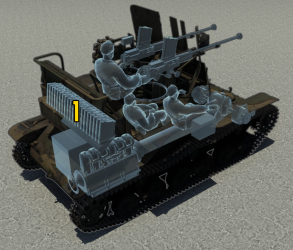
| Full ammo |
1st rack empty |
Visual discrepancy |
|---|---|---|
| 26 | 2 (+24) | No |
Usage in battles
The So-Ki can use its speed to capture bases and attack lightly armoured targets when the opportunity presents itself. For the most part the So-Ki should fit its purpose in the AA role, rather than an AT one. The sound of aircraft engines will let the player know if potential enemies (and targets) are coming.
At its battle rating, the So-Ki can penetrate the sides of some tanks like the M4 Sherman, Strv m/42 EH, Pz.IV F2 and Pz.III L, but this is usually only possible at close range. This tank can deal with many lightly armoured targets like other SPAAs and some Light Tanks so if the situation requires, the So-Ki can take the role.
As for an AA role, this vehicle's performance is competent. It can shoot down low-flying aircraft with relative ease, and anyone who knows how to properly lead targets can easily shoot down most aircraft this tank will meet.
Pros and cons
Pros:
- Rapid firing cannons allow for excellent aerial coverage
- Great mobility allows for fast repositioning
- Frontal protection from light machine guns
- Great ammunition storage capacity
- Fast reloading time
- Small size can make the vehicle harder to hit
- Twin guns allows the vehicle to still fire if one is damaged
- Decent damage and penetration with the rounds
Cons:
- Thin hull armour
- Low crew count
- Gunner is exposed and has no rear protection. Driver and Loader can be knocked out in one shot
- Vulnerable to incoming artillery rounds and aerial strafing/bombing
- Rapid-firing quickly depletes medium-capacity ammunition magazines
History
Prior to World War II, Japan experimented with developing anti-aircraft guns based on several different platforms, including trucks, tanks and railroad cars. Production ended up developing an SPAAG that could shoot down aircraft at low altitudes. The Japanese military, however, wanted their SPAAGs to have the capability to also shoot down aircraft at medium altitudes too. Alongside the range requirements, the vehicle needed to be highly mobile to provide adequate protection to convoys from aerial attack.
By 1941, Japan started prototyping two variations of the new SPAAG. The first prototype was a single-mounted 20 mm Type 98 cannon on a Ke-Ni hull with a roofless turret known as the "Ta-Se", short for Taikū ("anti-air") Sensha ("tank"). The second prototype was a dual-mount Type 98 on the same hull with an open gun platform.
The crew positions of the So-Ki featured a driver situated in the centre of the vehicle, right under the anti-aircraft gun emplacement. To aid in protecting the cannon crew (gunner and loaders) a gun shield was added to block or deflect small arms fire. A bench for the crew was mounted at the rear of the platform and could be folded out of the way to allow for placement of more ammunition magazines if necessary.
The total ammunition capacity for this vehicle was 22 magazines plus two more already loaded in the cannons. The rate of fire for the Type-98 cannons was around 830 rounds per minute, however, velocities between rounds differed due to round type and explosive filler.
Unfortunately for the Imperial Japanese Army, the So-Ki never entered production and by the time it was ready to enter service, the needs of the army in anti-aircraft vehicles had significantly evolved. Engineers were also having a difficult time massing sufficient resources necessary for the mass production of new units because of the increasing Allied progression in the Pacific.
Media
- Skins
See also
- Vehicles equipped with the same chassis
External links
| Hino Motors, Ltd. (日野自動車株式会社) | |
|---|---|
| Light Tank | Ke-Ni |
| SPAA | Ta-Se · So-Ki |
| Japan anti-aircraft vehicles | |
|---|---|
| Ke-Ni Derivatives | Ta-Se · So-Ki |
| Wheeled | Type 94 |
| Tracked | SUB-I-II |
| Radar SPAAG | Type 87 |
| Missile SPAA | Type 93 · Type 81 (C) |
| USA | ▅M16 MGMC · ▅M19A1 · ▅M42 |


